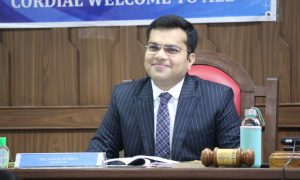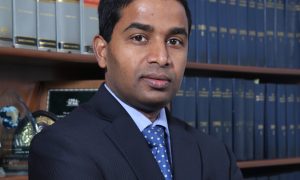SONAL ALAGH, PARTNER AT ALAGH & KAPOOR LAW OFFICES, ON BEING A FIRST-GENERATION LAWYER, HER LITIGATION EXPERIENCE AND ESTABLISHING HER LAW FIRM

This interview has been published by Maaz Akhtar Hashmi and The SuperLawyer Team.
When did it dawn unto you that Law is the correct pathway? Could you walk us through your journey in the field of Law?
During my high school days, I was very passionate about my extempore and debate competitions. At that point, I decided to be a lawyer who argues in court (I was introduced to the terms litigation only during law school days). However, since my school days, “stage fright” was unknown to me. Therefore, it was not much of an effort game for me to put across my point of view in an easy, convincing, and assertive manner.
Consistency, persistence, and the go-getter attitude has been a game-changer for me, as I fixed my dream to have my own law firm during my law school days itself. One important lesson that I have been learning all along my journey is never to ignore any opportunity (even the smallest) that comes across your way, as you don’t know what lies on the other side of it.
You graduated with B.A.LL.B. from Vivekananda Institute of Professional Studies and went on to pursue your masters in Insolvency, Securities, and Investment Law from Government Law College, Mumbai, after litigating for a few years. What prompted you to pursue your masters in Insolvency, Securities and Investment Laws?
Firstly, in my final year of law school, I opted for banking laws as my specialisation, which helped develop my interest in various RBI schemes of debt resolutions. Subsequently, I was fortunate enough that my graduation was the same as the year of commencement of the Insolvency and Bankruptcy Code, 2016. My interest was further developed in this subject while handling the first mandate in December 2016 while working with the dispute resolution team of Desai & Diwanji.
In the year 2016 itself, I realised that the insolvency laws provide a fair playing field for all the lawyers and the way the Insolvency Code consolidated various legislations was very intriguing for me. Additionally, I thought it was a perfect combination of commercial litigation and debt resolutions, which made me pursue my masters in this field. During my masters, I realised that insolvency laws could not be seen in isolation without the entire cloud of all the commercial laws. In order to excel in commercial litigations, dispute resolution and debt resolution, insolvency laws seen in isolation are a very small part of it.
You have multiple titles and achievements credited to your name, from working with Desai and Diwanji, Khaitan Legal Associates, being a consultant to the Oyo Group, to starting your law firm Alagh & Kapoor Law Offices. If you were to introduce yourself in a word or two, how would you do it?
I am definitely a “Go-Getter Apologist”.
You have also pursued a diploma in GDPR from Henley Business School, United Kingdom. How do you think GDPR helps in guiding and regulating the way companies across the world handle their customer’s personal information and protect individual’s data?
Though India does not fall within the circuit of the European Union, and thus, even today, GDPR compliance is highly underrated amongst Indian entities. However, keeping in mind the global approach of all the MNCs and even the Indian entities having their offshore offices, all of them have to comply with the GDPR guidelines. Therefore, in today’s time, any entity has to be very sensitive towards protecting their Client’s data as the Client has provided the same under strict confidentiality.
Learning about GDPR was very important for me from a long-term view of managing and running your own law firm. Because of this learning graph, today, We – Alagh & Kapoor Law Offices handles its Client’s data with the utmost sensitivity. Often, the team at Alagh & Kapoor Law Offices provides training sessions to Corporates, assisting them in being GDPR Compliant by providing training sessions.
You joined Desai and Diwanji as Associate Lawyer immediately after law school. How has that experience shaped you and contributed to your interest in the field of litigation?
While I was interning with Desai & Diwanji during the final year of my law school, I was given a preplacement offer by the dispute resolution team of Desai & Diwanji to join them as an Associate. That has been the biggest stepping stone for me as I cannot stress enough how amazing the Dispute Resolution team of Desai & Diwanji is. Starting from teaching me that how a list of dates has to be drafted to giving me opportunities to even appear before the Supreme Court of India at a very young age has shaped me into what I am today. Therefore, I would take this interview as an opportunity to show my gratitude towards the Desai & Diwanji team (Delhi) as I would not have reached where I am today if they would not have shown confidence in me during my early years.
During the formative years of your legal practice in Indian Law Firms and Courts, proper guidance and the right tools are required to manage each step of the process. How important is it for someone to find a mentor when a lawyer sets foot into litigation?
It is one of the most important factors in litigation, especially if you are a first-generation lawyer. I cannot emphasise enough on how important it is to have a good mentor who is ready to invest in you. I have been very fortunate indeed and have utmost gratitude towards all my seniors who have invested their time in teaching me the nuances of the law and the important surviving skills required for the field of litigation.
You have also been involved in multiple non-performing asset (NPA) accounts referred for the insolvency resolution process under the Insolvency Bankruptcy Code (IBC) mandated by the Reserve Bank of India. How has your experience been working under the tenets of the IBC, 2016?
The first assignment that I started working on, under tenets of the Insolvency and Bankruptcy Code, was in the month of December 2016 (with Desai & Diwanji’s Team), when the law was too new for anyone to have a grasp on it. The journey of reading the code from scratch, interpreting the same, enhancing my knowledge along with the judicial interpretation of the code, being updated with the innumerable amendments, notifications, precedents and being vigilant on all the developments, all of it together has been one unforgettable bliss.
To gain an in-depth knowledge of the legal demands of companies, you decided to advise corporates and entered a retainership with the OYO Group as a litigation consultant, wherein you had handled dispute resolution & strategic advisory for contentious litigations. How did this experience help you cater to a larger and more diverse clientele in the future?
Working with law firms gave me an in-depth understanding of the procedural functioning of the courts, the judicial forums of India. It helped me enhance my efficiency in delivering my assignments. However, working as a litigation consultant for a corporate made me privy to the direct demands of corporates and their expectations when they outsource work to a Law Firm. It has also helped me enhance my knowledge about the working of the corporates, including the backhand operations, which further helps me today to better understand my clients’ needs.
Alagh & Kapoor Law Offices is a full-service law firm representing various clients ranging from beauty & healthcare, hospitality, infrastructure, banking & finance to real estate. What piece of advice would you like to give to people aspiring to establish their firm?
My one advice would be to be competitive while quoting the fees and provide the utmost efficient services to the best of your capabilities, which would justify the trust that your client has shown in you while giving you the assignment. Please be open to taking any and every kind of mandate that comes your way. Keep in mind to work consistently on enhancing your networking skills. In the end, it is non-negotiable to be updated on current affairs/precedents/legal developments and to keep brushing your drafting skills.
The pandemic has not only affected the way we work but also the way we manage our clients. What are the top three leadership challenges you have faced while working amid the COVID crisis?
I might sound a little unrealistic in my approach towards my work, but the pandemic has been another stepping stone for me. With deep cuts in the pockets of the corporate sector, boutique law firms with competitive fee quotes and equally efficient services were need of the hour. During the pandemic, the advice I received from my seniors in the legal fraternity has also played a very important guiding factor for me. Starting my own youtube vlog on insolvency laws (during lockdown) was very challenging as well as knowledge enriching for me.
All the challenges that I have faced, from building the trusts of corporates (being young and new market players) to adopting the new litigations technologies of virtual hearings, all have been a very knowledge enriching and learning experience for me; and it continues to be. My top three would be:
- Networking by virtual meetings;
- Making sure that your team does not lose motivation; and
- Being consistent in your efforts, focusing on long terms goals.
How do you take care of your mental health and strive towards a good work-life balance? Do you still get time to pursue your hobbies amid a busy schedule?
To be honest, the only thing that has made me conscious about my mental health is the outbreak of the pandemic. And to cope up with the same, the only successful habit I could develop is reading a lot of good books (for example the 5 AM club), that motivates you to further develop efficient habits and help you in being more organised. One thing that we will have to ensure on our own is striving a work-life balance and making sure to leave few hours of your day just for yourself. I prefer it to be early morning. The amount of change a 20 mins early morning workout can bring to your day is highly underrated.
What would your advice be to all the young lawyers and law students who are deeply passionate about making a career in Law?
Being a smart worker does not mean you can escape being a hard worker. The only prerequisite to excel in the legal profession is to really have a passion for excelling and achieving in it. Choose law only if you are passionate about it. Don’t expect easy and quick money without having your decent share of struggle. Be open to learning from the experience of your seniors in the fraternity. At last but definitely not the least, be updated.
In the end, I would like to mention that you might come across a lot of people who might demotivate you or may question your career decisions. However, if you are passionate about your work, do not listen to anyone and follow your heart.
Get in touch with:























